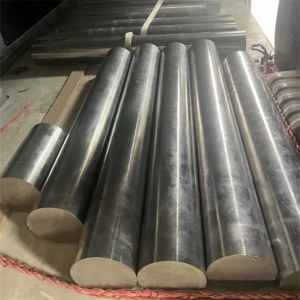Get in touch with us
Leave a message
Titanium Alloy Bar is the ultimate choice for high-performance and corrosion-resistant applications. This remarkable titanium alloy combines exceptional strength with outstanding corrosion resistance, particularly in marine, chemical, and biomedical environments. The unique alloy composition delivers reliability where other materials fail. Titanium Alloy Bar maintains its integrity from aerospace components to surgical implants under extreme conditions. Our precision-controlled Titanium alloy formulations ensure consistent performance in your most demanding lightweight, high-strength alloy applications.

Titanium Alloy Bar is governed by standards like ASTM B348, ASTM F136, and AMS 4928, ensuring quality across grades such as Grade 2, Grade 5 (Ti-6Al-4V), and Grade 23. These standards define properties like corrosion resistance, strength, and finish. For instance, a Grade 2 Titanium Alloy Bar aligns with ASTM B348 for general corrosion-resistant applications, while Grade 5 offers superior strength and toughness per the same spec. Classification splits into types such as commercially pure (e.g., Grade 2), alpha-beta alloys (e.g., Grade 5), and biomedical grades (e.g., Grade 23), with grades further distinguished by finishes like polished or mill finish. Titanium Alloy Bar, typically available in diameters ranging from 0.125″ (3.18mm) and above, adheres to similar standards but is often tailored for aerospace, medical, and marine applications.
Titanium Alloy Bar comes in a wide range of sizes to suit diverse needs. Common dimensions include:
This flexibility ensures Titanium Alloy Bar fits everything from small medical implants to large aerospace components.
Titanium Alloy Bar comes in various forms and finishes, each tied to specific manufacturing processes:
| Grade | Characteristics | Applications |
|---|---|---|
| Grade 5 Titanium Alloy Bar | High strength and toughness (Ti-6Al-4V). Excellent corrosion resistance. Good weldability. Resist temperatures up to 600°F (315°C). | Aerospace (e.g., aircraft turbines, structural components). Medical implants. High-performance engine parts. Sports equipment. |
| Grade 9 Titanium Alloy Rod | Moderate strength (Ti-3Al-2.5V). High corrosion resistance. Excellent formability and weldability. Good for low to moderate temperatures. | Aerospace (e.g., airframes, hydraulic tubing). Marine components. Chemical processing equipment. |
| Grade 1 Titanium Bar | Low strength, high formability. Excellent corrosion resistance. Non-magnetic. Good weldability. | Airframes. Heat exchangers. Desalination units. Surgical implants. |
| TC11 Titanium Alloy Bar | High strength and heat resistance (Ti-6.5Al-3.5Mo-1.5Zr-0.3Si). Good durability in low-temperature impacts. Superior corrosion resistance. | Aerospace (e.g., engine components). Marine environments. Chemical processing plants. High-temperature structural applications. |
A: Titanium alloy bars, like Grade 5 (Ti-6Al-4V), often outperform steel in corrosion resistance and strength-to-weight ratio, making them ideal for aerospace and medical uses. Steel, however, is cheaper and stronger for heavy-duty applications.
A:Titanium alloy bars can be costly due to processing challenges and are difficult to machine, requiring specialized tools. They also have lower wear resistance compared to some steels, necessitating coatings for certain uses.
A: Titanium alloy rods, such as Grade 5, are not ideal for knife blades due to lower hardness and edge retention compared to steel. However, they’re excellent for handles or frames, offering lightweight strength and corrosion resistance.
A: Titanium alloy bars resist rust exceptionally well, forming a protective oxide layer that prevents corrosion in seawater, acids, and humid conditions, making them durable for marine and medical applications.
A: Titanium alloy rods are not cheap, with prices ranging from $20 to $50 per kg due to raw material costs and complex manufacturing. They’re a premium choice compared to steel or aluminum.
A: Titanium alloy bars can last decades, even in harsh environments, due to their corrosion resistance. With proper care, they maintain integrity for 20-30 years in aerospace, marine, or medical uses.

Professional manufacturer of premium specialty alloys, offering stainless steel, Hastelloy, nickel-based alloys and processing services. Delivering superior metallurgical solutions for aerospace, petrochemical, marine engineering and other demanding industries.